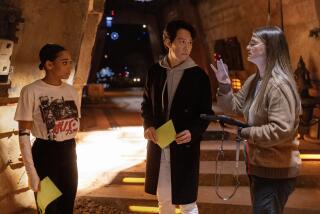Are the best ‘Star Wars’ stories now in video games? ‘Star Wars: Squadrons’ makes the case
Walking out of “Star Wars: The Rise of Skywalker” when I saw it last December, I had one, immediate reaction: what a disappointment — if only it had been built for video game consoles instead of movie theaters. I wanted to play it.
That’s not to say video games’ stories rank below their cinematic peers — far from it — but it is an acknowledgement that the “The Rise of Skywalker” was laid out like an old-fashioned video game, where one action set piece builds to a larger, slightly more difficult action set piece. Acrobatic fights while floating across desert landscapes, intense lightsaber duels and blaster battles on a starship — all of them revealing new heroic powers — really only make sense if your understanding of storytelling is to “level up.”
There are better ways.
For all the deserved attention “The Mandalorian” series on Disney+ has received, the just-released game “Star Wars: Squadrons” reminds us that some of the best “Star Wars” stories in recent years have been in the video game space. Maybe after multiple generations have grown up playing with “Star Wars” toys and games and now have the ability to walk around a “Star Wars” planet at Walt Disney World and Disneyland, when or if it reopens, we’ve grown accustomed to viewing “Star Wars” as a work of play. Or maybe games have impacted media so much it’s better to simply play a game rather than view content inspired by one.
“Star Wars: Squadrons,” available now for PCs, the PlayStation 4 and Xbox One, is an argument for the latter. This is a work, in fact, that doesn’t suffer from an action-focused, little-narrative approach — every second I’ve spent with this game has fulfilled the sort of personal “Star Wars” fantasy that’s enhanced by giving the audience a bit of autonomy. It’s also, for those privileged enough to own a virtual reality headset, the VR experience I’ve had at home that most represents what it’s like to be in a theme park.
Rather than throwing spectacle after spectacle at me, it lets me partake in them, to scratch the itch of being in the center of intergalactic, aerial dogfights. But less than emphasizing awe, “Squadrons” centers on the feel of controlling a ship, making me feel a part of something bigger. Sure, that’s just digital, fictional warfare, but “Squadrons” understands the appeal of “Star Wars” is that it’s open to everyone, and any of us can be ace pilots if given the chance. We don’t admire; we act.
There is nostalgia at play. The game recalls some of the LucasArts spaceflight simulators of yore that I obsessed with in my suburban Chicago basement, but there’s a sense of swiftness and polish that makes this game as appealing as a coin-op arcade machine. And yet it’s also in possession of confidence, a depth that I’ll need to master if I really want to go hard in multiplayer battles.
As a solo player without many friends who play multiplayer games — OK, fine, none — I’m not so sure I’ll take the time to learn each individual ship and its advantages or disadvantages. But I’m not sure I need that because “Squadrons” has me smiling throughout, even if I accidentally turn my X-wing into an asteroid. While throwing me into larger-than-life moments — disable a giant, Imperial starship and help lead a capture of it — “Squadrons” succeeds in making them feel livable and conquerable.
In other words, by focusing so intently on the act of spaceflight, I don’t feel like a tourist in the “Star Wars” universe, thrown a litany of “greatest hits” moments. Instead, “Squadron’s” single-focus obsession allows my imagination to run free rather than have to wonder where I am, who I am or what I’m supposed to do now. I can just fly. And shoot. And it feels great.
“If you go back to the very first pitch we had for ‘Squadrons,’ before if it was even a prototype, we had a controller map and it was color-coded,” says Ian Frazier, the creative director of the Motive Montreal-developed game for Electronic Arts. “If you just needed to fly the ship and shoot stuff, and this was all you needed, that was one color. Then there was a different color for an intermediate level of control and another color if you wanted to master some of the fancy stuff. We built the game with that in mind.”
Sit back and enjoy the ride? No more. From Disney’s new Star Wars: Rise of the Resistance to Japan’s upcoming “living video game” Super Nintendo World, theme-park audiences must participate to get the full experience.
That layering approach has meant, in the week that I’ve had the game, I’ve had as much fun taking on practice missions as I have completing the single-player narrative — somewhere around 10 hours — and even getting my butt kicked in a few multiplayer matches. Simply flying one of the ships in the game — “Squadrons” allows us to be either good (New Republic) or evil (Imperial) forces — results in a sense of curiosity. I’m often left wondering what ships can or can’t do, and whether I can repeat a trick I seemed to have lucked into.
And to think, I approached the game with skepticism.
When I first booted it up, I was rubbed slightly the wrong way in knowing the single-player campaign shifts perspectives from good to evil. Roll your eyes all you want, but in “Star Wars” I like to be the good team since modern “Star Wars” narratives have leaned too heavy into authoritarian imagery. The last time I was at Galaxy’s Edge at Disneyland last March, I noticed I tended to completely avoid the area surrounding the bad guys of the First Order. The fascist imagery there is laid on too thick for me.
But the story, set shortly after the events of “Return of the Jedi,” meaning, thankfully, Emperor Palpatine is “dead,” doesn’t glorify the Imperial Army and is an opportunity for players to get familiar with different ships for multiplayer battles. Frazier says the original plan was to do two short stories, one from the perspective of each side, but during development the team decided it worked best to shift back and forth, which allows the New Republic to still be the team we’re rooting for while emphasizing the various characters on the differing sides.
“We knew from the beginning that you aren’t going to be so-and-so, this name character that we created and crafted,” says Frazier. “We wanted you to feel factions. Part of how we do that is put you in the roles of the boots-on-the-ground soldier, not the main character who has the Force and they make whole movies about but the people who are making the war happen.”
And this particular space conflict has a mesmerizing look, especially in virtual reality. “Squadrons” feels built for VR, and Frazier confirms it was from Day One conceived as a VR game. This makes sense as we play. The scenes between battles, when we’re stagnant and jumping the camera around our base, are staged primarily to manage motion sickness in the VR space. We as a character are stationary, simply clicking a spot in the environment if we need to change perspectives.
When using my PlayStation VR headset — Sony has stated its VR add-on has sold more than 5 million units — I was taken back to when I was 10 or 11 and playing the early 1980s “Star Wars” arcade game. Its vector graphics were already outdated by the time I was 10, but that old box still allowed me pretend that some day I could fly in my own “Star Wars” ship.
Lost rabbits and a missing nighttime rave: An insider’s look at how a “Fall Guys” course is made from start to finish with level designer Megan Ralph.
The magic of theme parks has made that somewhat a reality, as Disney’s Millennium Falcon: Smugglers Run is essentially a giant video game. Yet as impressive as that ride is, it’s still built to the constraints of having to support theme park capacity and multiple guests per vehicle. It doesn’t, in short, let me live out the dream of blasting TIE fighters in the same way “Squadrons” does. But that’s also the danger of building in-person experiences with screens. Eventually you’ll be competing with what we can do at home.
And make no mistake, “Squadrons” in VR has that “wow” factor.
I had a brief panic when, in the midst of flying my X-wing, I had to pause the game and remove the headset. I tossed it aside and returned an hour later, but when I put it on all I saw was cracked glass. I was horrified — did I accidentally break my VR headset? I hadn’t. Simply the glass on the X-wing was cracked, but the effect worked well enough to fool me.
Out of sight was my embarrassingly old, cat-destroyed couch and in its place was a grimy cockpit with filthy knobs and shattered glass. I paused the game again and lowered the AC to ensure it was blasting cold air in my face. I was ready to fly.
'Star Wars: Squadrons'
More to Read
The biggest entertainment stories
Get our big stories about Hollywood, film, television, music, arts, culture and more right in your inbox as soon as they publish.
You may occasionally receive promotional content from the Los Angeles Times.











